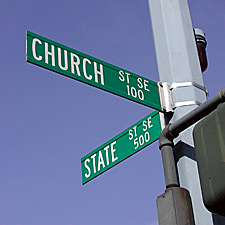I think we're going to have an enjoyable time, because I am sure there will be a range of people here tonight.
"¢ You may be terrified and disgusted by the so-called "rise of the religious right' in Australia. You want to reclaim Australia for secular liberalism.
"¢ Or, you may be terrified and disgusted by the so-called "decline and moral rot' in Australia. You want to reclaim Australia for the Lord Jesus.
The hostility of both you groups to each other typifies Manning Clarke's depiction of Australia as an ongoing fight between Christianity and the Enlightenment.
But there is also a much larger group here tonight. You are terrified by how helpless you feel when this topic comes up, and you don't have anything to reclaim because you haven't got a clue what to think in the first place. You probably nod vigorously when you hear the phrase "separation of Church and State', yet you break into a sweat when any of a number of questions comes up:
"¢ "Should an office-bearer of the State exhibit religious faith and/or allow it to influence their actions at all?'
"¢ "Can a Church criticise government policies, or should it just shut up and get on with the job of helping people?'
"¢ "When should the State ever legislate over the Church's life? When may it assist the Church's goals?'
"¢ "Should religious leaders ever hold office in the State?'
 We might recall controversies from the past five years over:
We might recall controversies from the past five years over:
"¢ Archbishop Peter Jensen's comment that the PM was "out of step with God';
"¢ Catholic Tony Abbott's horror at Australia's high abortion rate;
"¢ the PM's appointment of an Anglican Archbishop to Governor General;
"¢ the PM's appointment of an evangelical Anglican as head of Fair Pay Commission
"¢ a NSW private member's bill opposing Church employment policies;
"¢ the then Deputy PM John Anderson's call for Australians to examine their relationship with God;
"¢ Alexander Downer's attack on an Anglican primate's comments on Iraq and Bali as inappropriate; and
"¢ Kevin Andrew's rebuff to Church leaders who question industrial relations reforms.
I won't pretend to you that we can solve all this tonight and tomorrow. We are cracking open the door to a roaring, cacophonous debate spanning every continent over many centuries. Don't imagine that recent Australian discussion is due to some strange, new, "unAustralian' rise of the religious right. Rather, to be a member of a Western nation since the time of Christ has been to navigate some very rugged terrain:
Few themes have been more constant in European history than that of "Church and State.' The problem of defining the relation between these two powerful but diverse social institutions is one which, though often below the surface of things, has always been liable to recur, and in recurring to arouse long and bitter dispute.
Unfortunately for us, Australians have lazily presumed on many centuries of theology, philosophy and tradition, without bothering to teach or learn it. We are a little like Alisdair Macintyre's picture of peasants in a Mad-Max landscape, picking up bits of ruined wreckage of moral and political ideas, and arguing about them, with little idea of where they've come from, and how they once fit into a whole.
Nevertheless, I hope that that these New College lectures can give us pause for breath. Instead of the "Church-and-State' discussion being some angry, half-baked quarrel that takes place on the run, whenever a church leader comments or whenever a religious politician is honest, I hope we can use this time to begin to map the contours of the problem.
The area that I actually know anything about is evangelical Christianity. My omission of other religions is, in part, a form of respect for them. I don't like it when people talk about Christianity as if they are experts when they are not, so I'll be very limited in what I have to say about other religions. However, I think we'll still discover points along the way that will mean something for our relationships with those of other religions, and in tomorrow's lecture, I will offer a small note on Islam.
Tonight's lecture from me will be in four main sections.
"¢ Firstly, I'll examine the origins of the idea of a "wall of separation' between Church and State
"¢ Secondly, I'll outline what I think Christianity makes of the difference between the two.
"¢ Thirdly, I'll consider the more general interaction between religion and political life; and
"¢ Fourthly, what Christianity makes of their interconnection.
Click the link below for a pdf copy of the full text of Andrew Cameron’s lecture:






















